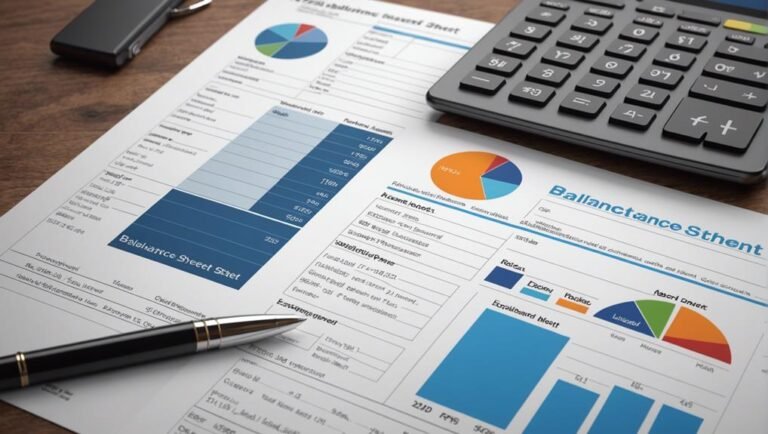Accounting Cycle Definition: Timing and How It Works
The accounting cycle, a fundamental process in financial management, plays a pivotal role in ensuring the integrity and accuracy of a company's financial data. Understanding the timing and intricacies of this cycle is essential for businesses to maintain transparency and make informed decisions. By exploring how each step interconnects and the impact of timing on financial reporting, organizations can optimize their operations and strategic planning. This discussion will shed light on the nuances of the accounting cycle, offering valuable insights into its significance and functionality in the domain of financial management.
Key Takeaways
- Accounting cycle begins at the start of an accounting period.
- Sequential progression through key steps ensures accurate financial reporting.
- Timely completion before period end is essential for decision-making.
- Technology integration enhances efficiency and data security in the process.
- Systematic record-keeping aids in tracking transactions, analyzing performance, and ensuring compliance.
Timing of the Accounting Cycle
Initiating at the commencement of an accounting period, the timing of the accounting cycle encompasses the systematic progression through its requisite steps over the designated timeframe.
The accounting cycle timeline typically extends throughout the duration of the accounting period, aiming for an ideal completion time before the end of the period. Efficient completion of the accounting cycle is important to guarantee timely financial reporting and decision-making.
Achieving an ideal completion time allows for the timely identification of financial trends, assessment of business performance, and adherence to reporting deadlines. Delays in completing the accounting cycle can result in inaccurate financial statements, hampering the ability to make informed business decisions.
Organizations work to streamline the accounting cycle timeline for effective financial management.
Key Steps in the Accounting Cycle
The key steps in the Accounting Cycle encompass a series of systematic processes aimed at accurately recording, analyzing, and reporting financial transactions for organizational clarity and compliance. These steps guarantee the financial statements are prepared correctly and provide meaningful insights for decision-making. The table below outlines key components and actions involved in the Accounting Cycle:
| Step | Description | Importance |
|---|---|---|
| Journal entry process | Recording financial transactions in the journal | Accuracy |
| General ledger posting | Transferring journal entries to the general ledger | Financial statement analysis |
| Trial balance creation | Summarizing all ledger balances for accuracy | Interpretation |
Integration of Technology in Accounting
Technology plays a pivotal role in revolutionizing and enhancing the efficiency of accounting processes. The integration of technology in accounting operations has led to greatly improved efficiency through automation of repetitive tasks, enhanced accuracy, and streamlined processes.
One key aspect where technology excels is in guaranteeing data security, protecting sensitive financial information from unauthorized access or breaches. By automating tasks such as journal entry recording, general ledger posting, and financial statement generation, software systems not only reduce the margin for human error but also offer real-time insights into financial data.
This integration with technology not only boosts productivity but also ensures that accounting functions are performed with precision and in compliance with regulatory standards.
Comparison With Budget Cycle
In financial management, the comparison between the Accounting Cycle and Budget Cycle serves as a fundamental distinction in handling historical financial reporting for external stakeholders and future performance planning for internal management, respectively. The Accounting Cycle focuses on historical analysis, ensuring accurate and compliant financial reporting for external users.
In contrast, the Budget Cycle pertains to future planning, aiming at internal management purposes to strategize for upcoming operational performance. Both cycles play pivotal roles in financial management, with the Accounting Cycle emphasizing past financial events and the Budget Cycle focusing on forecasting and planning for future financial activities.
This distinction enables organizations to maintain a balance between historical accountability and future-oriented decision-making.
Importance of Systematic Record-Keeping
Drawing on the foundational principles of financial management, systematic record-keeping stands as a cornerstone in ensuring the integrity and accuracy of an organization's financial data.
Efficient record-keeping provides a structured approach that enhances the organization's ability to track financial transactions, monitor cash flows, and analyze financial performance. By maintaining organized records, businesses can easily retrieve information for decision-making processes, financial analysis, and regulatory compliance.
Additionally, systematic record-keeping contributes to the overall efficiency of operations by streamlining processes, reducing errors, and improving productivity. This structured approach also benefits the organizational structure by fostering transparency, accountability, and a clear audit trail, which are essential for maintaining trust with stakeholders and ensuring long-term sustainability.
Conclusion
To sum up, the accounting cycle is a meticulously structured process that guarantees accurate financial reporting and informed decision-making.
Ironically, some organizations overlook the importance of systematic record-keeping and timely completion of this cycle, leading to potential errors and misinterpretations in financial data.
By neglecting these fundamental principles, businesses risk compromising the integrity of their financial information and jeopardizing their ability to make sound strategic choices.







